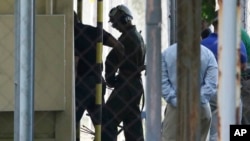The trial of a U.S. Marine accused of murdering a Philippine transgender in October is starting Monday. The trial begins almost one year after the two countries signed a much-vaunted military agreement.
Private First Class Joseph Scott Pemberton was charged with murder after Jennifer (formerly Jeffrey) Laude, who was last seen with him, was found dead on October 11 in a hotel bathroom in Olongapo City in Subic Bay.
Harry Roque, an attorney for the Laude family, said the court and Pemberton’s lawyers attempted three times to get the family to agree to a lesser charge of homicide, which in the Philippines is a bailable offense, unlike murder.
“We have rejected all posture and we have maintained our position that we want to see justice served and we want to see Pemberton behind bars - for life,” said Roque.
The killing happened just one day after joint military exercises between the two countries had concluded. The 19-year-old Pemberton was among the participants. The exercises capped a year that saw the strategic relationship between the Philippines and the U.S. at its strongest in recent years.
President Barack Obama visited in April on the day the two countries signed a new agreement that would see more American troop visits and give them space at Philippine bases to store ready-to-use military hardware.
Nationalist groups oppose the agreement and filed petitions with the country’s high court questioning its constitutionality. Implementation of the new deal is on hold pending the Supreme Court decision.
After the killing, the groups renewed their call to junk the Visiting Forces Agreement with the U.S. They vehemently oppose a provision in the VFA that calls for any U.S. military personnel facing criminal charges to be in U.S. custody through the entire duration of judicial proceedings.
U.S. personnel are holding Pemberton at the Philippine military’s main headquarters in metro Manila.
Renato Reyes, secretary-general of the New Patriotic Alliance party, said national sovereignty is at stake in the case.
“It’s good that the trial will be starting and that’s a step forward in trying to achieve justice but it’s really a shame that up to now Pemberton remains in U.S. custody in clear violation of our sovereignty,” said Reyes.
The Foreign Affairs Department sought a waiver on the custody rule. But the U.S. refused, citing terms of the VFA.
But public passion over the case has waned in recent months. The country has been more engrossed in a bungled January operation in Mamasapano town on southern Mindanao Island. The effort to capture two internationally wanted terrorists resulted in nearly 70 deaths - mostly of police - after a prolonged gunbattle between police commandos and Muslim rebel factions.
Center for Strategic and International Studies Programs Director Carl Baker said that as the trial gets under way, three things will make the public take notice once again.
“You have the influence of the Mamasapano incident. You have the fact that the Americans have said ‘We’re going to maintain custody of him based on the VFA,' and then you’re also going to have the problem of frustration with their own legal system,” said Baker.
A Philippine Senate committee report on the Mamasapano incident shows at least six Americans at a police command post provided intelligence, maps, equipment and cooperation, but never joined in the fighting. As part of the VFA, the U.S. does counterterrorism training in the Philippines, but does not take part in any combat operations.
Apart from the nationalists wanting U.S. troops out of the country, CSIS programs director Baker does not foresee a major effort to end the U.S. presence. He said the Philippines is more concerned with maintaining a minimum credible defense posture against a very visible China, and it needs the U.S. to do that.




